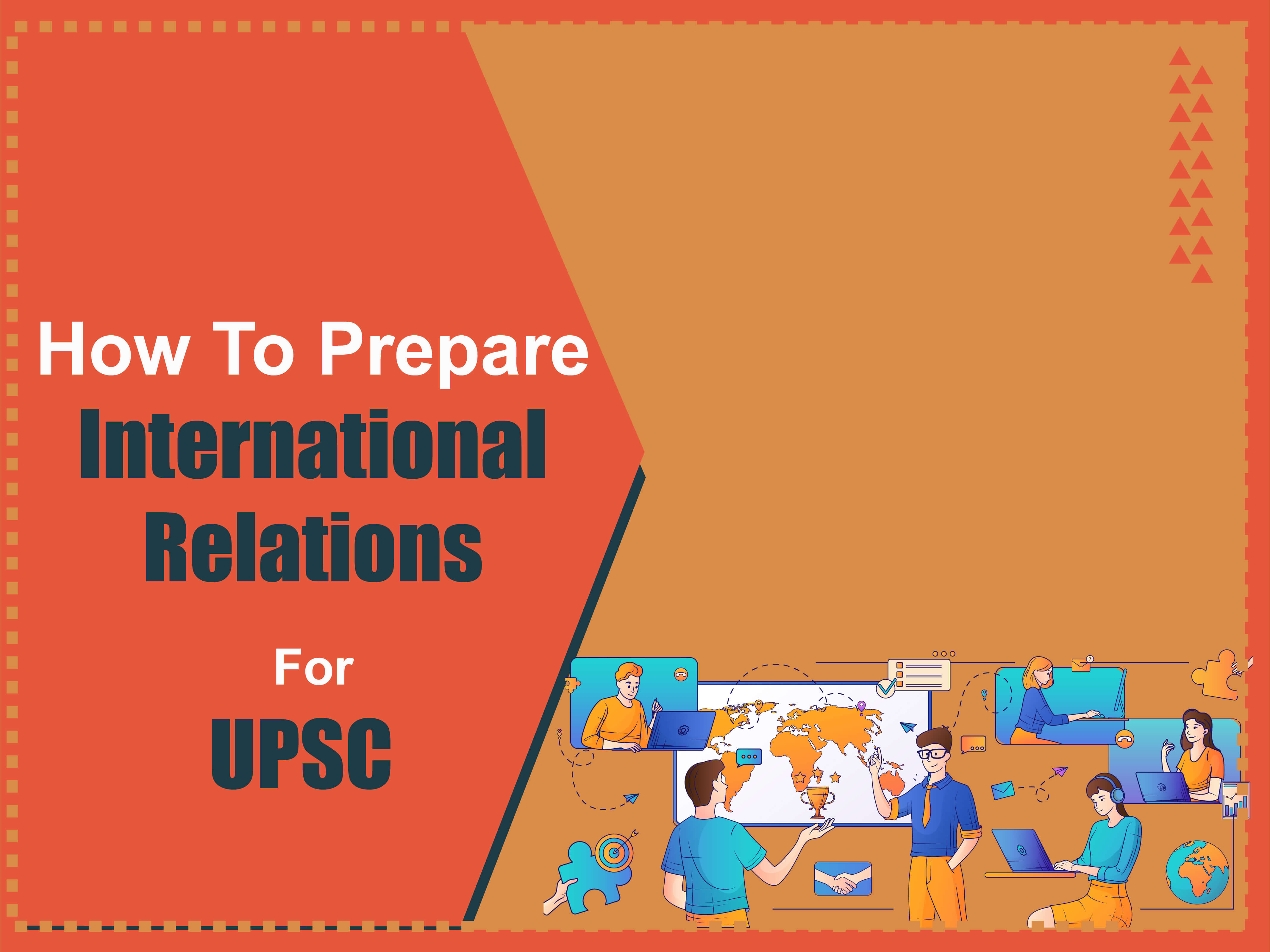
How to Prepare International Relations for UPSC
Whether in International Relations (IR) or following a different route, the UPSC (Union Public Service Commission) journey requires some forethought. Preparing for International Relations for UPSC is one of the concerns that most prospective candidates ask. In this easy-to-read guide, we've distilled all you need.
Understanding the Importance of International Relations:
International Relations UPSC is like studying how countries are related and discovering the trends in world events. It's important for both the Preliminary and Main exams and reminds you of the tremendous scope of world affairs. You thus make a better-informed civil servant.
Effective Steps for International Relations Preparation:
-
Get to Know the Syllabus:
First, find out what you have to study. International Relations on the UPSC syllabus includes how nations cooperate, transnational organisations and important events. Knowing this, you know what to write about.
-
Connect with Current Affairs:
Keep yourself informed of what's going on around the world. Stay current by reading newspapers and online news. What impact might these events have on relations between nations? It's like being a new detective.
Breaking Down International Relations Preparation:
-
Simple Study Material:
Use easy-to-understand books and websites. Then, learning is less like a lecture and more fun. In other words, it's finding interesting stories about how nations interact.
-
Maps and Pictures Help:
Why not study with maps and pictures like an adventure? Maps show where the countries are, and pictures make things easier to understand. It's like having a treasure map for your quest for knowledge.
-
Read, Revise, and Remember:
Each day, read a little, go back over what you've read and try to memorise it. It's like building a LEGO tower-brick by brick. Each piece is just a little bit of information, and with every new piece, your tower becomes more solid.
Challenges and Solutions:
-
Some Things Are Tricky:
This can seem a little tricky at times. Don't worry; it's normal! It's like solving a puzzle. Take your time, and they'll fall into place.
-
Ask for Help:
Ask your seniors who have passed the UPSC examination questions without thinking twice about it. It's like having your superhero sidekick, a friend and a teacher to clear things up for you.
-
Subjects That Make You Curious:
For the optional subjects, pick what interests you. It's kind of like picking out your favourite ice cream flavour. If you like it, studying becomes more fun.
-
Look at Past Experiences:
Recall what you liked to study before. If you were a history or geography buff in school, perhaps you are now as well. It's like returning to your favourite playground.
-
Use Your Everyday Tools:
Just use the tools you are already familiar with-notebooks and pens. It's as if you are getting ready for a picnic. The right tools help you enjoy your day, and for UPSC preparation, your tools are the study materials.
-
Break Down Big Topics:
If a topic is too large, divide it into smaller pieces. It's eating a big slice of pizza. Bite one mouthful at a time, and the whole slice (or topic) will be gone.
-
Different Ways to See Things:
International relations lends itself to different theories, like looking at things from different angles. It's kind of like having a different pair of shoes for each activity: running shoes for jogging and comfortable shoes for walking. Each theory is like a different pair of shoes.
-
Globalisation Is Like Making Friends:
Globalisation means countries becoming like friends. They exchange ideas and run things. Think of it like having pen pals from around the world. You write letters and get to know each other.
-
Writing Practice:
Practice writing answers. Imagine that you're recounting something you learned. It's like being a storyteller. The more you practise, the better your stories become.
-
Imagine You're Explaining to a Friend:
Your Style When you write, picture yourself talking with a friend, just like describing a film you've seen. Keep it simple and exciting. This will help you to actively retain what you've learned for your UPSC preparation.
-
Like Checking Messages:
Stay informed about world news like you check your phone messages. You're like in a group chat with the whole world.
-
Make Learning Fun:
Learning is a game. Make it fun! It's not about winning or losing but the ride there.
-
Real-life Examples:
But what if we could learn with real-life stories? Case studies are like fascinating tales about countries and how they meet challenges. It's learning from others ‘experiences. This shows you how theories and concepts operate in the practical world.
-
Connecting Theory to Practice:
It's like playing with LEGOs. You have pieces (theories), and through case studies, you see how they fit together to make something interesting. But this is not just the study of theories. It examines them to solve real-world puzzles.
-
Being Fair and Honest:
Imagine countries as friends. Ethics relates to fairness, sincerity and how you treat your friends. It's like playing a game without cheating. Teach countries about how to treat each other with respect and kindness.
-
Think About Consequences:
Think of it like a superhero making decisions. Every action has consequences. Ethics in International Relations means moving beyond thoughtless action and always reflecting on how other people might be affected.
-
Focus on What You Enjoy:
Like picking your favourite candies, study first what you like. If you like a topic, you'll want to study it further. But don't try to eat all the candies in one sitting; focus on each candy.
-
Take Breaks:
UPSC preparation is a bit like playing a game. Don't forget to take breaks. It's like timeouts in a game. For your brain to rest and for what you've learned to sink in, it needs time.
-
Set a Study Time:
It's as if you had arranged to play your favourite game at a given time. This fixed study time will give you a routine. Asking your books and study materials out on a playdate.
-
Use a Calendar:
It's like planning a birthday party. A calendar tells you what to study each day. It's like choosing what to do at your party. An effective schedule means a better and more enjoyable program of study.
-
Talking to Smart Friends:
Wander around where intelligent people say smart things. A conversation with really knowledgeable friends. Listen to what they say, ask them questions and model yourself on their behaviour.
-
Online Learning:
What if you could learn from your favourite videos? Online platforms are computerised teachers. It's just like watching fun movies and learning something new. Enjoy learning through these platforms.
Choosing Optional Subjects for UPSC:
Strategic Preparation Steps:
Understanding International Relations Theories:
Putting Your Knowledge into Words:
Staying Up-to-Date:
Incorporating Case Studies for Practical Understanding:
Ethics in International Relations:
Balancing Depth and Breadth:
Building a Study Routine:
Interacting with Experts:
Conclusion: Your UPSC Adventure Awaits!
Climbing the mountain of International Relations in UPSC isn't necessary. Treat it then as a thrilling adventure-discovering the world from your desk. It's your journey; take it one step at a time with the tools beside you already. May you be rewarded for your wonder and excitement-filled UPSC journey.






